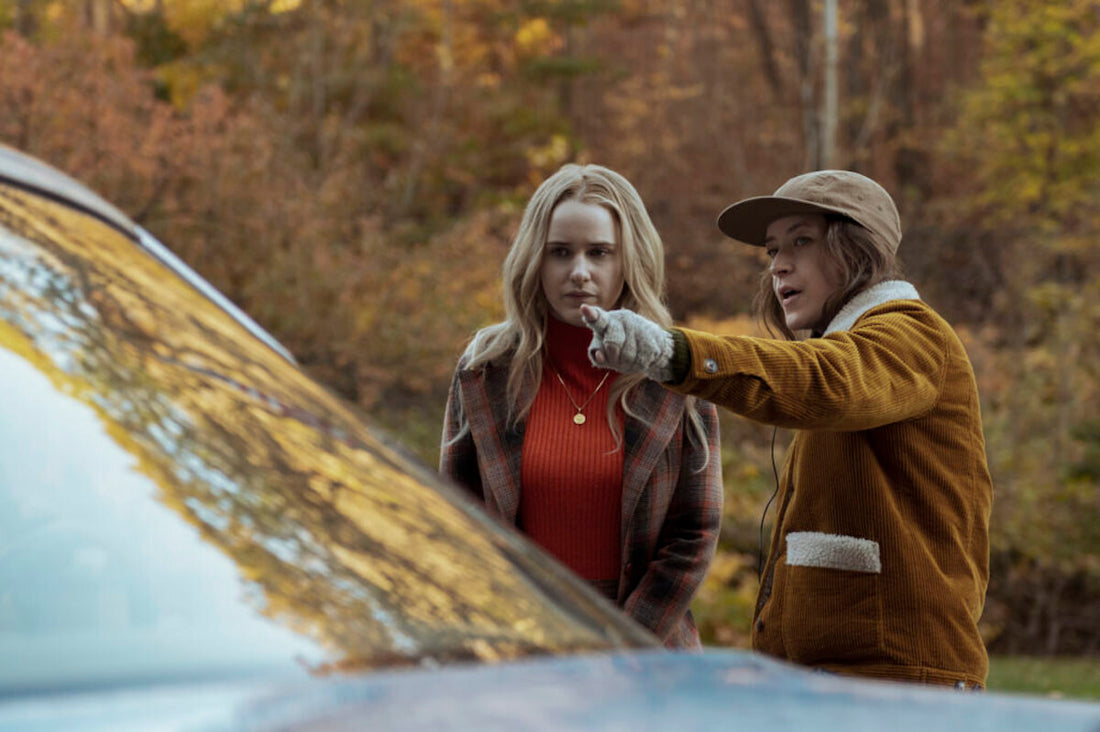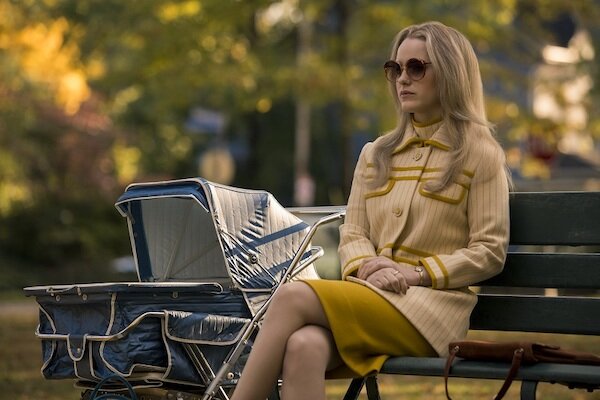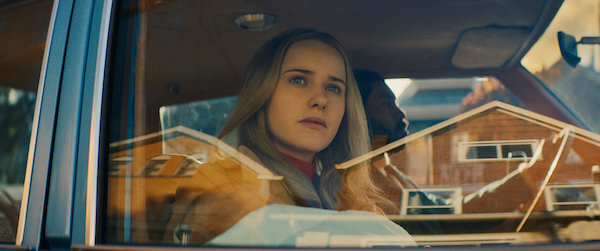Julia Hart returns to screens big and small, confirming her presence as one of our most brilliant filmmakers working today. For her latest trick she takes her ambition to the next level with I’m Your Woman, a 1970s crime movie that casts the gangster’s wife in a new light with her own agency. Ella Kemp meets the filmmaker to find out more.
Jean doesn’t know how to be alone. There’s a difference between being left on your own, feeling lonely and knowing how to survive alone. The sharp-eyed independent filmmaker Julia Hart, alongside her writing partner, producer and husband Jordan Horowitz, relishes these distinctions in her subversive 1970s crime thriller I’m Your Woman.
It’s a movie that wears its influences on its perfectly-tailored, patterned and flared sleeves, one that sees The Marvelous Mrs Maisel powerhouse Rachel Brosnahan turn her talents to a different kind of headstrong woman on a mission. We’re not here to grapple with sickly-sweet Girl Power messages of generic empowerment, no, Hart and Horowitz are too lucid and motivated for that. I’m Your Woman lifts the curtain on the woman who was always there, always waiting while her man – that charismatic, reckless, often selfish and hurtful man – got the job done. Here, Jean has her own business to take care of too.
We’re also blessed with a fully-rounded vision of a woman as they exist in our world: women who are tired, women who burn toast and break eggs, women who have to take care of their children and themselves as well as basking in the glow of their stylish crime caper. It could only come from the mind and heart of a woman who knows about family, and who, lucky for us, knows how to make a damn good movie.
I caught up with Hart to hear about the in-betweenness of the 1970s, chosen families, the soul-affirming power of Aretha Franklin and more.
Your film is visually outstanding with so much period detail, but its ambition feels timeless. Why did you choose to set it in the 1970s?
I really appreciate you saying that because it’s so important when you're making a period piece, to find a contemporary lens through which to portray the past. The reason I decided to set it in the 1970s is twofold. The first part is that Jordan and I were watching a bunch of crime dramas when we came up with the idea: Michael Mann’s first film, Thief. The Dustin Hoffman film Straight Time, Sam Peckinpah’s The Getaway, Peter Yates’ The Friends of Eddie Coyle and of course The Godfather.
I was so struck watching all of those films back to back seeing how they all had these incredible actors playing the wife or girlfriend of the male protagonists, but they only had a handful of scenes. And they were played by these incredible actresses – Diane Keaton, Allie McGraw – and they get kicked out of the movie at a certain point and we never find out what happens to them. And so I love the idea of shifting the camera’s perspective over to that character. And so as much as I think there are a lot of stories to tell about women looking forward, there are so many genres that were dominated by male protagonists and filmmakers of the past, that we can go back and find incredible stories to tell within.
The other part of it was that the 1970s was such a time of in-betweenness, especially in America. It wasn't the civil rights movement of the 60s and it wasn't where we landed in the 80s with Reagan that, of course, set us on the downward spiral that America has been in ever since – hopefully, we're on our way back up now… But it's such an interesting time period, in particular for women in the midst of the women's movement, in the midst of gaining equal rights, in the midst of moving out of the home and into the workplace in a more robust way. And of course with the Black characters as well, in the midst of the Black Power movement, on the tail end of the Civil Rights Movement, it’s so fascinating to look at the gender and race politics at play in America then, and how much of that we're still dealing with today.
Rachel Brosnahan is a force of nature, embodying so many different sides to Jean. Beyond starring, she’s also a producer on the film. How do you think that role fed into her performance?
I agree, I think “force of nature” is the best description I’ve heard in all these conversations I’ve been having about her! She is such a brilliant, special and dedicated human. She commits, as fully as you see her committing to the character of Midge Maisel, to everything in her life and work. When Jordan and I first sent her the script, because we thought she was such a brilliant actress and such an incredible chameleon, she was the one who said, “I'm starting a production company, and I would also like to produce this with you guys.” Jordan and I are big believers in saying yes, when people want to create with you, you don't say no! And so she came on as a producer and spoiled me to the point where I’m now like, the lead actor should always produce because it just brought such perspective to all the elements of production beyond her character.
Aretha Franklin’s ‘(You Make Me Feel Like) A Natural Woman’ perfectly illustrates and elevates a central scene in which Jean seems as free and at ease as we ever see her. What does that song mean to you?
I have two little kids, a two-year-old and a six-year-old and I love to sing to them. But when you have to sing songs every single night to two different kids, you start to run out of options! I found myself starting to sing songs that weren't about babies, that weren't explicitly lullabies, and the lyrics completely transformed for me. I mean, that song is obviously explicitly about romantic love. But when you're starting to sing it to a child, it becomes about something completely different. And I just love the idea of Jean, even in her cluelessness about motherhood, hitting on something so essential. This idea that a child can make you feel like a natural woman and make you feel like your soul was in the lost and found and finally been claimed, and just how powerful that connection can be between mother and child.
All your films draw rich and galvanising portraits of women, but I’m Your Woman feels like your most authoritative and direct take on family dynamics. And so what was it like writing and producing that alongside Jordan?
It was really special. Jordan and I obviously start from a place of family in our work. When you get started from a place of family and love, it's hard to want to move too far away from that, both in terms of the world we create, and then the people we choose to create our world with. We have a really happy family life. I mean, we've had our ups and downs, just like any other couple, but we love being with our kids and working together. And as painful as this pandemic has been for so many people, getting to just be together as family is such a blessing. And so it's funny that we then portray these really messed up dynamics – but that's what's more entertaining, ultimately.
There’s a line that Jean’s husband Eddie says that has stuck with me, specifically alongside the film’s title. He comes home one day and says, “He’s our baby.” In terms of a family member or a partner, do you think a person can ever truly belong to anyone?
I love the connection to Eddie’s line because that definitely plays into the title. It came from a line in Michael Mann’s Thief, when Tuesday Weld says to James Caan, “I’m your woman and you’re my man.” We purposely put the title at the beginning and the end of the film, because at the beginning she belongs to Eddie and by the end she belongs to herself. And the same is true of Harry the baby as well. Like you say, what does it mean for someone to go from, as Harry and Jean both do, being a possession to having their own agency in their ownership of themselves? And also when you think of the idea of a chosen family, when you choose a family I don’t think you belong to each other, you’re just choosing to be together. How much more fulfilling that is than being an object, a possession or an inevitability to someone else.
It’s such a knotty definition that comes from quite slippery, exciting writing. Your scenes are also written visually in a way that belongs to a school of films that see women dealing with more responsibility to be action heroes than they’ve been afforded in the past – but also just getting on with life in the process. My friend reminded me of this tiny moment in Birds of Prey where two women pass each other a hair tie before starting a fight, and here you’ve got Jean rocking Harry when he needs to be rocked, feeding him when he needs to be fed even if people are threatening to kill you. Can you talk me through writing scenes in that way – full of action but also full of common sense as to how you would need to keep this small human alive?
It’s so female, isn’t it? The duality of constantly having to do both things at the same time. And Christina Hodson, who wrote Birds of Prey is actually a good friend of mine!
Great minds.
I love that movie too. And it’s so honest, the way in which we constantly have to be juggling all of that at once while the men in those crime dramas just stick their gun in their pants and walk out the door. And it's funny, because that experience doubled itself on set. Here are a bunch of adult professionals with a lot of money on the line and a very specific time schedule that you have to stick to, and we're at the mercy of the baby. If the baby needs to eat, you shut down. If the baby is asleep, you have to wait. It's so real, and I love when I see moments like that in movies, where women are just having to deal with the reality of what it means to be a woman. It makes you feel so seen.
You’ve discovered so many brilliant actors who have gone so far after starring in your movies. I’m thinking of Lily Rabe, Gugu Mbatha-Raw, Rachel Brosnahan…
Don’t forget Timothée Chalamet!
Oh, of course, I left him until last specifically. And so looking ahead, I’m wondering who currently inspires you in terms of actors you think are a bit under the radar but you can see really changing the game?
I’ll start by pointing out Marsha Stephanie Blake in our movie because she is such a formidable actress and deserves all the parts, I’m so excited for people to get to see her in this. I really hope she gets the recognition she deserves, because she’s such an incredible talent.
Well, we know that’s what happens: you star in a Julia Hart film and then you skyrocket.
Another actress I’ve been excited about is Love Simone, who was incredible in Selah and the Spades, I think she’s going to be a huge star. And one more I want to throw in there is Kiera Allen, who just starred opposite Sarah Paulson in Run. She’s a remarkable actress in her early 20s and she’s just so good, I can’t wait to see what happens next for her.
Ella Kemp (@ella_kemp) is a film critic and editor based in London. She is the Contributing Editor for READ ME and the Film Editor for the Quietus. She writes for NME, Empire, Letterboxd and more. Her favourite word is “verklempt” because it’s what she often is.



